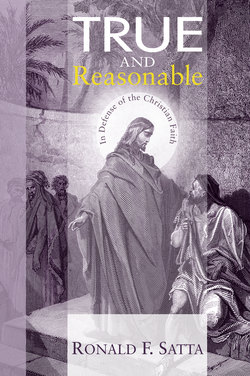Описание книги
In the Bible, faith is contrasted with sight, not with reason. The apostle Paul consistently reasoned with his listeners, persuading them regarding the truth of his message, establishing a precedent for Christian apologetics (Acts 17:17, 18:4, and 18:19). He did so because the Christian faith is reasonable.
This defense begins with arguments in favor of theism: a finite universe, physical laws hospitable to life, and the origin and complexity of life. These factors suggest the existence of a brilliant and powerful creator who designed the universe, our world, and us.
But is it possible to know the designer? Yes. The next section deals with the authority of Scripture, and more exactly with why the Bible is superior to every other source, legitimizing its claim to divine origin. Several key prophetic passages are analyzed, including Isaiah 53 and Daniel 9. Since it is humanly impossible to accurately forecast the future with specificity, the fact that Scripture consistently does so indicates that it is a special composition whose message about the designer should be carefully considered.
From the authority of the Bible, the work turns to the person of Jesus Christ. He alone fulfills the prophecies of Isaiah, Daniel, and the other prophets. Moreover, the cohesive message of the apostles-the primary sources-following the crucifixion, even under considerable duress, further testifies to the reality of the bodily resurrection of Jesus. When these factors are combined, the Christian faith is endorsed by considerable philosophical, scientific, historical, and biblical evidence, making its truth claims quite probable, intellectually satisfying, and entirely reasonable.
This defense begins with arguments in favor of theism: a finite universe, physical laws hospitable to life, and the origin and complexity of life. These factors suggest the existence of a brilliant and powerful creator who designed the universe, our world, and us.
But is it possible to know the designer? Yes. The next section deals with the authority of Scripture, and more exactly with why the Bible is superior to every other source, legitimizing its claim to divine origin. Several key prophetic passages are analyzed, including Isaiah 53 and Daniel 9. Since it is humanly impossible to accurately forecast the future with specificity, the fact that Scripture consistently does so indicates that it is a special composition whose message about the designer should be carefully considered.
From the authority of the Bible, the work turns to the person of Jesus Christ. He alone fulfills the prophecies of Isaiah, Daniel, and the other prophets. Moreover, the cohesive message of the apostles-the primary sources-following the crucifixion, even under considerable duress, further testifies to the reality of the bodily resurrection of Jesus. When these factors are combined, the Christian faith is endorsed by considerable philosophical, scientific, historical, and biblical evidence, making its truth claims quite probable, intellectually satisfying, and entirely reasonable.
